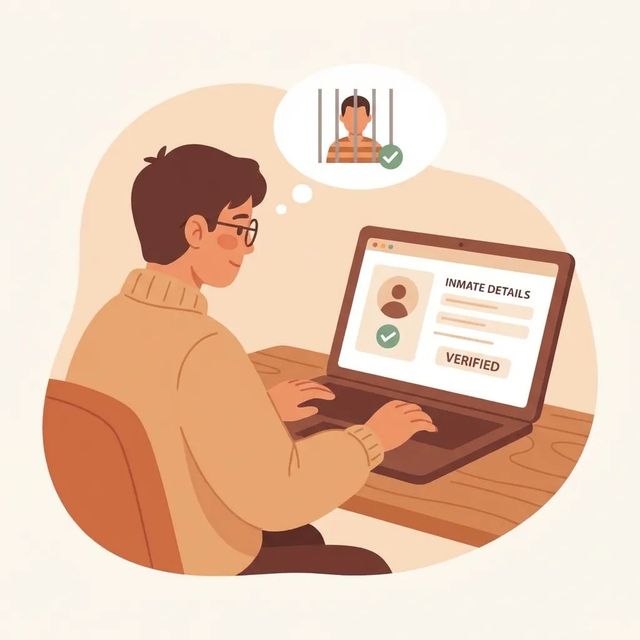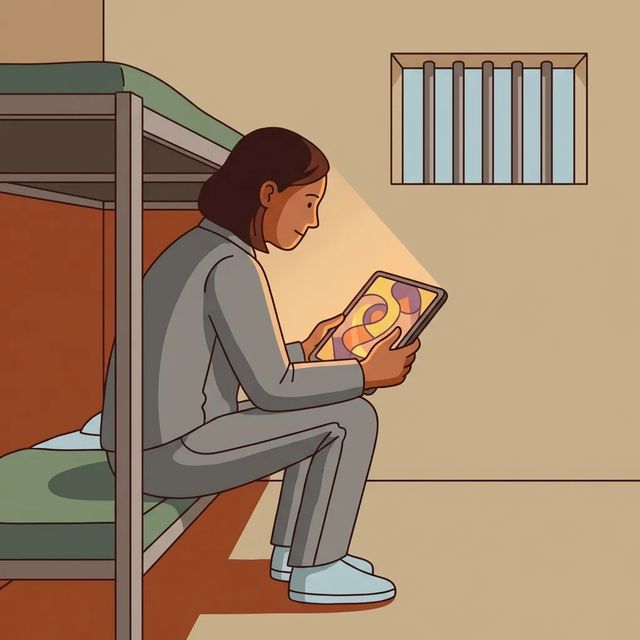Southern Nevada Corrections
Explore
Find an Inmate at Southern Nevada Corrections
Search for a loved one and send messages and photos in minutes.

Guides for This Facility

Before You Send Money to Southern Desert Correctional Center: A Checklist for Families
Sending money to someone at Southern Desert Correctional Center (SDCC) is straightforward once you know the approved methods. Use this checklist to pick the right deposit option, avoid delays, and spot common money-request scams.
Read Guide
Complete Contact Guide: Phone Numbers and Vendor Contacts for Southern Desert Correctional Center
Trying to manage calls, deposits, or tablet services for someone at Southern Desert Correctional Center? You'll get faster answers calling the right vendor line rather than the prison itself. Here are the key numbers in one place.
Read Guide
What Phone Restrictions Might Apply at Southern Desert Correctional Center (and How to Verify Them)
Phone access at Southern Desert Correctional Center (SDCC) comes with several layers of restrictions. Expect limits on when calls can be placed, how long each call can last, and potentially caps on the number of calls or total minutes allowed per month. Security controls are standard. NDOC monitors and records calls, and may require voice validation from the person incarcerated before calls connect. Certain number types—like 800 numbers—can be blocked entirely, and specific numbers may be blocked as well. Phone access isn't guaranteed either. NDOC can temporarily or permanently revoke phone privileges for disciplinary issues, gang affiliations, or even at the request of the person being called. To find out exactly what restrictions apply to your loved one at SDCC, contact the facility directly.
Read GuideAt a Glance
Communication
- SDCC uses Viapath Technologies' ConnectNetwork for inmate calling and account billing.
- You can set up a prepaid AdvancePay ConnectNetwork account online, via Viapath's automated system, or by speaking with Viapath Customer Care.
- ConnectNetwork provides a customer support phone number for payments and account help.
Mail & Letters
- Books and calendars are permitted to be mailed to offenders but are subject to limitations and reference AR 711 and AR 750.
- Offender personal clothing and food packages must be ordered using the SecurePak Package Program rather than mailed directly.
- Outside items are prohibited when NDOC offers the same item through the facility Canteen or AccessSecurePak.
Sending Money
- You can send money via a Lockbox Deposit Coupon (cashier's check or money order), an Access Corrections card deposit (MasterCard or Visa), or by calling Access Corrections.
- Deposit coupons must be printed from the NDOC website or obtained from the offender before mailing.
- Money orders and cashier's checks received directly by NDOC are held for review and are available to the offender fourteen calendar days after receipt.
Contact Info
- Southern Desert Correctional Center’s main listed phone number is 702-899-0905.
- Family Services cannot verify individuals by phone or email and provides only general information.
- Family Services can be contacted at (775) 977-5707 for general, non-verification questions.
Facility Info
- The NDOC Family Services Division provides general information and assistance to family members of incarcerated offenders.
- Phone use restrictions vary by facility; contact the facility where the offender is housed to verify restrictions.
- Offenders may use funds from their NDOC trust accounts to purchase debit calling time through the facility Offender Services/Commissary section.
Based on official sources and community feedback. Learn how we verify
Topic Overviews
Communication
Southern Desert Corrections Center (SDCC) uses Viapath Technologies' ConnectNetwork for inmate calling and account billing. To receive calls, set up a prepaid AdvancePay ConnectNetwork account through the ConnectNetwork website, Viapath's automated system, or by speaking with Viapath Customer Care. ConnectNetwork also provides a customer support phone number for payments and account help. Calls from SDCC can also be placed as traditional collect calls billed to your local telephone bill—though your phone provider may apply spending limits and monthly fees. People incarcerated at SDCC can use funds from their NDOC Trust accounts to purchase debit calling time through the facility's Offender Services Commissary Section. Phone-use restrictions vary by facility, so contact SDCC to confirm any local limits.
Read full guideMail & Letters
Mail rules at Southern Desert Corrections Center are strict, so send only what's allowed. Books and calendars can be mailed, but they're limited and governed by NDOC regulations in AR 711 and AR 750. Clothing and food packages can't go through regular mail—order those through the SecurePak Package Program instead. A good rule: if NDOC already offers the same item through Canteen or AccessSecurePak, outside versions are prohibited. For help placing approved package orders, contact AccessCatalog customer service. All incoming mail is screened, so double-check addressing and content rules (including format, photo, and envelope restrictions) to avoid returns or rejection.
Read full guideSending Money
Southern Desert Corrections Center (SDCC) follows NDOC procedures for inmate funds. You can send money using a Lockbox Deposit Coupon with a cashier's check or money order, deposit to an Access Corrections card (MasterCard or Visa), or call Access Corrections to load funds. If you're mailing funds with a deposit coupon, you'll need the coupon printed from the NDOC website or provided directly by the offender before mailing anything. NDOC reviews money orders and cashier's checks received directly to help prevent counterfeits—those funds won't be available to the offender until fourteen calendar days after receipt. NDOC does not keep restitution payment schedules, does not require any fees for release, and takes no responsibility for offenders' requests asking you to send them money.
Read full guideContact
To reach Southern Desert Correctional Center, call the main facility line at 702-899-0905 for general questions. For Family Services, call (775) 977-5707—but keep in mind they provide general information only and cannot verify individuals by phone or email. Before visiting or making deposits, check the facility or agency page for current contact methods, hours, and any vendor portals you may need. When calling about custody status or account help, have the incarcerated person's full name and identifying details ready to speed things up. Also, don't rely on caller ID alone—payment, visitation, and account services often run through third-party vendors listed on the facility page.
Read full guideCommon Questions
Showing 6 of 17How do I set up a prepaid account to receive calls from Southern Desert Corrections Center?
Set up a prepaid AdvancePay ConnectNetwork account online, through Viapath’s automated system, or by calling Viapath Customer Care. You can also use the ConnectNetwork site or its support phone number for payments and account help.
CommunicationCan inmates at SDCC use their trust account to make phone calls?
Yes. People incarcerated at SDCC can use funds from their NDOC Trust accounts to purchase debit calling time through the facility Offender Services Commissary Section.
CommunicationAre calls from SDCC billed as collect calls, and who pays the charges?
SDCC calls may be placed as traditional collect calls, which can be billed to the recipient’s local telephone bill. Your phone provider may apply spending limits or monthly fees, and SDCC may have local restrictions—contact the facility to verify.
CommunicationCan attorneys or bail bondsmen be billed directly for calls from SDCC?
Yes. Accounts billed directly to attorneys and bail bondsmen are set up through Viapath.
CommunicationCan I mail books or calendars to someone at Southern Desert Corrections Center?
Yes. Books and calendars may be mailed, but they’re subject to limitations and the facility references AR 711 and AR 750 for what formats and content are allowed. Check the rules before you send them so the item isn’t returned or rejected.
Mail & LettersCan I send clothing or food directly through the mail to an inmate at SDCC?
No. Personal clothing and food packages must be ordered through the SecurePak Package Program, not mailed directly. If NDOC offers the same items through Canteen or AccessSecurePak, outside versions are prohibited.
Mail & LettersMore Guides
Ready to Connect?
Search for your loved one to start communicating today
Did You Know?
Southern Desert Corrections Center is a Nevada state prison. The facility uses Viapath Technologies for inmate phone calls and account billing.
This guide is based on feedback from 52 families and official facility documentation. Learn how we verify
